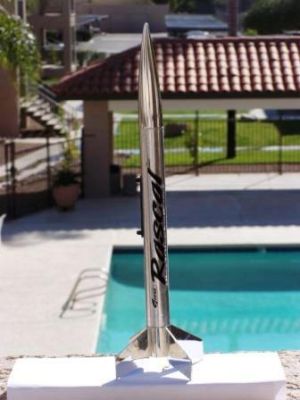| Construction Rating: | starstarstarstarstar |
| Flight Rating: | starstarstarstarstar_border |
| Overall Rating: | starstarstarstarstar_border |
| Manufacturer: | Estes  |

Brief:
This is an Estes Rascal Kit #1897 and is silver in color. It is a pre-assembled kit where the only thing you need to
do is attach the parachute to the rocket. The parachute is 12" in diameter, and the kit uses an Estes (rubber
band) shock cord attached to the launch lug inside the rocket body tube. No painting is required. The package says it
will go to 1200'.
Construction:
The Rascal uses a body tube 0.976" in diameter and has four fins and a plastic nose cone. The shock cord is
approximately 16" long, including the length inside the body tube. It uses a metal engine retainer clip as in most
of the Estes rockets, so no friction fit of the rocket engine is needed. The 12" parachute is plastic.
Since this is a pre-built rocket kit, it has almost no assembly requirements. I thought the instructions were good. Only the parachute needs to be attached to the nose cone. The nosecone fit nicely, not loose. I modified it by using a fishing snap swivel attached to the parachute to connect it to the nose cone so it would be able to twist on the way down after launching. This keeps the parachute shroud lines less twisted. The snap swivels can be bought in any number of places--I got mine at Wal-Mart. The rocket is sturdy.
Finishing:
There is no finishing required, I suppose one could clear coat the rocket if they desired.
Construction Rating: 5 out of 5
Flight:
The Rascal has a number of recommended motors. They are: A8-3, B4-4, B6-4, C6-5, and C6-7. I don't like to fly my
rockets so high that I have trouble recovering them, so I've only used the A8-3, B4-4, and B6-4. The A8-3 flew nicely
to I would estimate somewhere about 250', and the B engines would send it up to somewhere around 550'. I never measured
the altitude so these are just estimates, but the package says it'll go to 1200 feet. I put about 4 sheets of Estes
Wadding in it, and the rocket used a metal motor retention clip. It flew straight with a nice parachute deployment and
soft landing. I flew it ten times, but the shock cord separated on the 10th flight. It always flew well for me. No
"Cons" for flight characteristics.
Recovery:
I got 9 great flights, however, on the 10th flight, the rubber shock cord separated at the launch lug inside and the
rocket came down in 2 sections. The rocket body developed some wrinkling at the top of the engine mount from hitting
the ground. It will fly again, but it is a little unsightly. I suspect the decals wrinkle ever so slightly on the
extreme edge (of the decal) from the ejection charge heat inside the rocket body, but I could be wrong. This is the
only "con" with the rocket: the shock cord separating after multiple flights. That is the one thing that
needs to be improved. I plan on using the Estes tri-fold method of securing a new shock cord of 1/8" elastic about
3' long. I thought the recovery time was OK with the present 12" parachute.
Flight Rating: 4 out of 5
Summary:
This is a very good rocket that needs no assembly except for attaching the parachute. You can literally be launching
in minutes. It looks nice in silver, flies well with decent altitude, and recovers nicely. It's been a good rocket in
my stable. In fact, it's the rocket I've flown the most. The shock cord will get brittle and break eventually, and it
broke on mine on the 10th flight. I would say start checking it before you fly it after the 6th flight.
Overall Rating: 4 out of 5
 |
 |
Flights
 |
 |